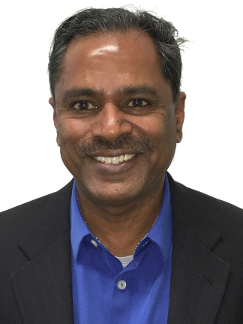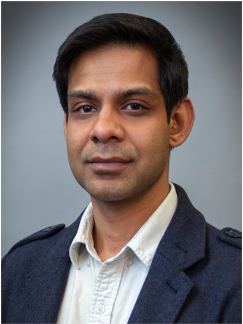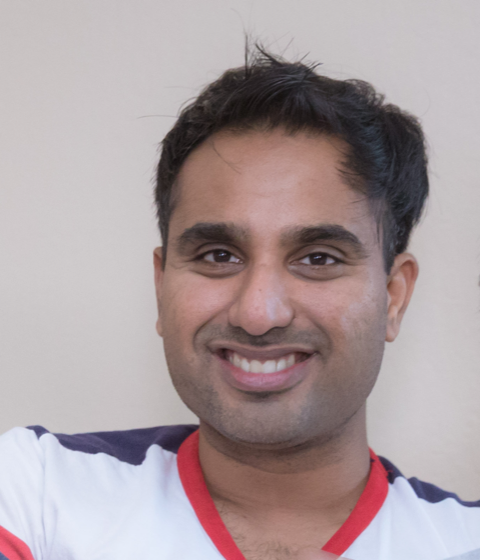
| Prof. Marimuthu Palaniswami, University of Melbourne
Title: Real-time Internet of Things Challenges: Convergence of Data, Communications and Learning
Abstract:
Internet of Things has evolved from a simple network of networks to a massive web of things. Currently there are about 30 billion Internet of Things (IoT) devices connected to the Internet. By 2020, an estimated 75 billion devices will be connected. Availability of low-cost sensors, increased memory capacity, higher computational power and advanced communications have led to generation of massive amounts of data. This is creating several challenges for real-time IoT applications. This talk will present and discuss some of the main challenges. The talk will also provide IoT case studies relevant to smart cities, intelligent transport systems, environment and healthcare. This talk presents how IoT can seamlessly integrate physical infrastructure and digital information across diverse platforms and applications to develop a common operating picture (COP).
Speaker Biography:
Marimuthu Palaniswami is a Fellow of IEEE and a distinguished lecturer of the IEEE Computational Intelligence Society. He received his Ph.D. from the University of Newcastle, Australia before joining the University of Melbourne, where he is a Professor of Electrical Engineering and Director/Convener of a large ARC Research Network on Intelligent Sensors, Sensor Networks and Information Processing (ISSNIP) with about 100 researchers on various interdisciplinary projects. Previously, he was a Co-Director of Centre of Expertise on Networked Decision & Sensor Systems. He served in various international boards and advisory committees including a panel member for National Science Foundation (NSF). He has published more than 500 refereed journal and conference papers, including 3 books, 10 edited volumes.
He was given a Foreign Specialist Award by the Ministry of Education, Japan in recognition of his contributions to the field of Machine Learning and communications. He received University of Melbourne Knowledge Transfer Excellence Award and Commendation Awards. He served as associate editor for Journals/transactions including IEEE Transactions on Neural Networks, Computational Intelligence for Finance. He is editor of Journal of Medical, Biological Engineering and Computing and the Subject Editor for International Journal on Distributed Sensor Networks. Through his research, he supported various start-ups, local and international companies.
As an international investigator, he is involved in FP6, FP7 and H2020 initiatives in the areas of smart city and Internet of Things (IoT). To enhance outreach research capacity, he founded the IEEE international conference series on sensors, sensor networks and information processing and served as General Chair for over 15 IEEE and IEEE sponsored Conferences. He has given several keynote/plenary talks in the areas of sensor networks, IoT and machine learning. His research interests include Smart Sensors and Sensor Networks, Machine Learning, IoT and Biomedical Engineering and Control.
|

| Prof. Soummya Kar, Carnegie Mellon University
Title: Communication-efficient distributed signal processing
Abstract:
The past decade has seen tremendous growth in research and infrastructure development for decision-making in networked cyber-physical systems and Internet-of-Things type environments, primarily focusing on centralized (cloud-based) paradigms for signal processing and machine learning. While beneficial in many applications, centralized computing and decision-making has limitations and there is a strong trend towards handling computation, data and decision-making at the periphery of the network, on devices and network agents. In addition to issues of scalability and high latency, the motivation for this trend is driven by the issue of user privacy and data security.
As an alternative to traditional fusion-center based cloud setups, in this talk we focus on fully decentralized IoT type architectures in which devices themselves perform the necessary computations using local data and peer-to-peer information exchange with neighboring devices to make inferences about an environment. Focusing on the problem of recursive parameter estimation, in the first part of the talk, we review distributed estimation approaches and algorithms based on the (iterative) consensus+innovations paradigm. We discuss performance metrics such as rates of convergence, communication complexity, and optimality. While order-optimal in the sense of error decay, the vanilla consensus+innovations approach is not optimized for communication efficiency, a key concern in resource constrained deployments. In the second part of the talk we present recent results on a new variant of the consensus+innovation approach tailored to achieve enhanced communication efficiency. The key idea is based on employing a sequential sparsification in inter-device communication, i.e., the inter-device communication rate is made to decay over time at a controlled rate. We demonstrate that the proposed modification achieves significant communication savings (in the order sense), while retaining the order of error decay. We also discuss applications of the proposed communication-efficient approach to problems of more general M-estimation and optimization (for machine learning).
Speaker Biography:
Soummya Kar received a B.Tech. in electronics and electrical communication
engineering from the Indian Institute of Technology, Kharagpur, India, in May 2005 and
a Ph.D. in electrical and computer engineering from Carnegie Mellon University,
Pittsburgh, PA, in 2010. From June 2010 to May 2011, he was with the Electrical Engineering Department, Princeton University, Princeton, NJ, USA, as a Postdoctoral Research Associate. He is currently an Associate Professor of Electrical and Computer Engineering at Carnegie Mellon University, Pittsburgh, PA, USA. His research interests include decision-making in large-scale networked systems, stochastic systems, multi-agent systems and data science, with applications to cyber-physical systems and smart energy systems.
|

| Dr. Krishna Gomadam, facebook
Title: Role of Licensed and Unlicensed Millimeter Wave in delivering the Promise of 5G
Abstract:
The perception of what it takes to be “connected” is rapidly emerging; from text to photos to video to 360 videos with VR/AR. Each level of immersion is built on the new generation of wireless technology from 2G, to 3G, to 4G and now 5G. The monthly data consumption “per sq-km” in urban centers across the globe is expected to be in the range of 100s of Terabytes by 2021. In order to meet this massive data demand “per sq-km”, extremely dense telecom networks are essential. The existing network infrastructure and deployment approaches will be challenged to meet such needs. Utilizing mmWave networks has several promising advantages over fiber for that last few hundred meters or a km. It is more affordable, requires a lower up-front investment, and deployment costs. Furthermore there is a time to market advantage. mmWave networks can be planned and deployed quickly. They are also more easy to maintain. Various design challenges and solutions for mmWave networks will also be discussed.
Speaker Biography:
Krishna Gomadam is currently a Wireless Systems Architect at Facebook where he is a technical lead for the mmWave wireless distribution network program (Terragraph). Previously he has had various stints at Marvell Semiconductor. Broadcom, and Qualcomm working on various aspects of LTE and LTE-Advanced modem design. Dr. Gomadam has made several contributions that are essential to 3GPP Releases 10 & 11. He has also made fundamental contributions to IEEE 802.11ay for the fixed wireless use case. He holds more than 75 patents.
Dr. Gomadam received the B.Tech. degree in electronics engineering from the Madras Institute of Technology, India, and the M.S. and Ph.D. degrees in electrical engineering from the University of California (UC), Irvine. He is a recipient of the UC Irvine CPCC graduate fellowship for 2005 and 2006. He received the UC Irvine EECS best paper award in 2007.
|